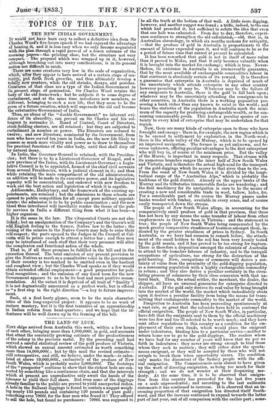TOPICS OF THE DAY.
THE NEW INDIAN GOVERNMENT.
IT would not have been easy te collect a definitive idea from Sir Charles Wood's five-hours speech if we had enjoyed the advantage of hearing it, and it isless easy when we only become acquainted with the plan-through a rapid perusal of a dozen columns of the morning papers—the, printing close, but the structure not very compact. The proposal which was wrapped up in it, however, although branching out into many ramifications, is in its general nation not difficult to 'catch.
-There are some creatures very low in the scale of organization, ulich, after they appear to have arrived at a certain stage of ma- t itiy, put forth fresh growths, and thus ultimately develop a y new creature, while the old shrinks, decays, and perishes. Creatures of that class are a type of the Indian Government in its present stage of genimation. Sir Charles Wood retains the body of the old framework ; but be subjects it to some degree of curtailment, and at the same time introduces new members, so different, belonging to such a new life, that they seem to be the germ of a future creation, which will supersede the old and become the substantive Government of India.
Thus, no abuse of the "double Government," no inherent evi- dence of its absurdity, can prevail on Sir Charles and his col- leagues to surrender it. Board of Control, Court of Directors, stock-holding ' eleotors are all retained ; but they are subjected to i curtailment n number or power. The Directors are reduced to twelve ; and new Directors, nominated by the Government, from men who have served ten voars in India, are the new life likely to possess so much more vitality and power as to draw to themselves the practical functions of the older body, until that shall drop off by natural decay. In India, the Governor-General is retained, with the Presiden- cies; but there is to be a Lieutenant-Governor of Bengal, and a new province of the Indus, withits Lieutenant-Governor ; a Legis- lative Council is to be appointed, formed of the chief civil servants from several Presidencies, with a judicial element in it; and thus while retaining the main compartment of the old administration, an addition will be made to its executive power, and its legislative capacity will be concentrated, and endowed with new freedom to work out the best action and legislation of which it is capable. Addisoombe, Haileybury, and the framework of the existing ap- pointments, are retained ; but the admissions to those schools are opened to public competition for all except pure military appoint- ments: the admission is to be by public examination ; and the new blood thus introduced will inevitably render the tissue of the pub- lic services in India a different thing from what it has been—a higher organism. It is the same in the law. The vituperated Courts are not abo- listied • but an amalgamation of the Company's and the Queen's will adryEnglish feeling to the former, Native law to the latter ; the raising of the salaries in the Native Courts may help to raise their self-respect; the posts opened to the JUdges in the Council at Cal- cutta will be prizes enough to attraot a better bar ; and thus men may be introduced of such stuff that their very presence will alter the complexion and functional action of the whole.
That is' if all these promises be fulfilled in the bill and in the execution thereof. The total omission of any present provision to
give the Natives as much as a consultative voice in the government of their country is too marked to be omitted even in the hastiest and roughest view ; but Sir Charles Wood speaks as if they would obtain extended official employment—a good preparative for poli- tical recognition ; and the omission of any fixed term for the new Government appears to us to be its best and most positive recom- mendation. At the outset it is deprived of all trait of "finality "; it is not dogmatically announced as a perfect work, but is offered as "a first step in the right direction "—a key to future improve- ment.
Such, at a first hasty glance, seem to be the main character- istics of this long-expected project : it appears to be no work of mature mastery, but it is the first tentative of an apprenticeship in Indian reform from head-quarters ; and we hope that the in- dentures will be well drawn up in the framing of the bill.


























 Previous page
Previous page